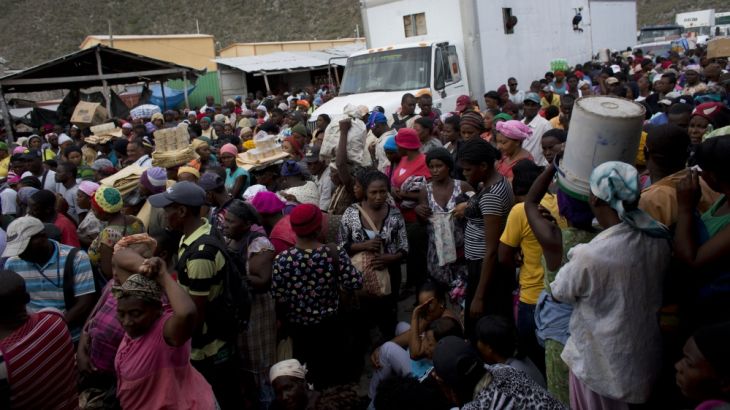In Dominican Republic, deportations cast long shadow
Proving legal right to stay here is no easy task for both Dominicans and Haitians born in shacks and lacking documents.

Santo Domingo, Dominican Republic – Before becoming a journalist, I was a junior high school teacher in Washington Heights, a Dominican enclave in New York City’s Upper Manhattan.
More than half a million Dominicans called the neighbourhood north of Harlem home.
Keep reading
list of 4 itemsCyprus suspends asylum applications for Syrians as arrivals rise
Agadez, Niger’s gateway to the Sahara, finds new life in the migrant trade
Forced from home, these Colombians struggle to live in a basketball stadium
A majority of my students came from families with undocumented parents, siblings, uncles or grandparents.
They had all settled in New York in that massive wave of Dominican immigration between the 1960s and1990s.
Some parents were afraid to come to school meetings because of their undocumented status.
Walking the streets, you heard the clack-clack of dominoes being played, and everywhere you looked you could see signs that people were trying to figure out a way to come out of the shadows, not always legally.
Lawyers posted marriage licence ads.
Black-market taxi drivers would sometimes strike up conversations about offers to wed a friend, thus getting them permanent residency.
This was a community that knew all too well the struggle of becoming legal in a country that puts up barriers to immigration.
Threat of deportation
Flash-forward nearly 20 years: In the Dominican Republic hundreds of thousands of people – not all of them migrants – live with the threat now of deportation.
Maybe they were born here but can’t prove one of their parents was Dominican. Maybe they came to work in the sugar fields.
Maybe they fled the 2010 earthquake and since then have eked out a life here.
There are thousands of different stories of the people who fall into this category.
|
|
All that matters to the government is that they prove they have a legal right to stay here. Not so easy, as many of these people were born in shacks and have no documents to speak of.
Of course, every country proclaims its right to draft and enforce immigration laws.
But having such vivid memories of the large immigrant scene in New York from the 1990s, it seems paradoxical to see so many targeted in this way.
Many Dominicans lead bi-national lives shuttling back and forth to the US. It seems they would understand that their Haitian neighbours often come here for opportunity.
Also in the rush to prove they can stay in the country, some people who were born here but missed a deadline to get a Dominican birth certificate, have scrambled even to get a fake Haitian birth certificate to prove at least they should get a work permit.
However, in the process they’ve stripped themselves perhaps of their own nationality.
And Haiti and the Dominican Republic have a troubled and turbulent history.
With brute force
Haiti ruled its neighbours with brute force in the first half of the 19th century.
Then, in 1937, under orders from dictator Rafael Trujillo, Dominican security forces massacred anywhere from hundreds to thousands of Haitians in the border area.
The violent past still stings for both Dominicans and Haitians. There’s also a racial component, as Dominicans often look down on Haitians for their “blackness”.
|
|
My crew and I arrived in the capital the day after the deadline passed for hundreds of thousands of undocumented people living and working in the Dominican Republic to file paperwork to prove they have a right to stay here.
Thousands of people had spent Wednesday lined up at immigration offices around the country. They were desperate to file any documents they could get their hands on.
One man we spoke to says he filed literally at the last minute before midnight but was told he didn’t have all the necessary paperwork.
According to the government, only 10,000 of the roughly 290,000 people who turned in documents had met with all the requirements.
The government says it is giving those people 45 days to complete their files.
Unofficially they are giving messages that those people will not be rounded up even if they are unable to fully complete their files.
Cy Winter, from the International Organization for Migrants, said it was infeasible that they would round up people en masse since most of those without papers contribute in some way to the economy.
“More likely,” he said, “Is they’ll target vagrants who don’t seem to have any work.”
That leaves an estimated 220,000 other people in limbo. They have no documentation proving they’re Dominican or that they have a right to stay here. And many don’t have proof they are Haitian either.
On the Haiti side
Over on the Haitian side of the border, our team met Andre Joseph, a 58-year-old man who had lived in the Dominican Republic since he was 10.
Joseph had gone to Dominican authorities for help when his neighbours were threatening him and his family on Wednesday.
Instead of helping them, they walked him over the Haitian border – back to a country he knows little about.
“I have lost everything,” he said. “I have nothing left. My life has collapsed. Now the next chapter in my life will be determined by the authorities.”
Amid his desperation, there was anger.
“No matter what, I won’t ever go back to the Dominican Republic. I would prefer to die.”
Perhaps Joseph will keep his promise, but even if he doesn’t cross back, thousands of Haitians will surely keep walking across the porous border looking for work and opportunity, both lacking so much in Haiti.